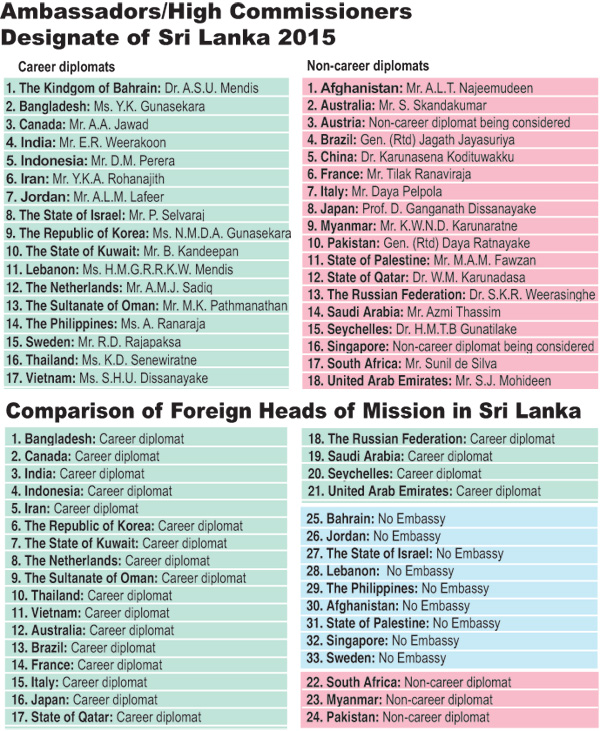News
Yahapalanaya’s political diplomats
After taking over as Foreign Minister, Mangala Samaraweera pledged that seventy percent of Sri Lanka’s missions abroad will be headed by career diplomats. Six months later, he has fallen well short of that target. Some stations that have long been manned by senior Foreign Service officers — such as Beijing and Vienna — are now to be administered by political appointees. The practice of sending non-career diplomats to important capitals such as Tokyo and Singapore also looks set to continue.
 Both missions will be manned by political heads, according to a list of names approved by the Parliamentary High Posts Committee. It was under the previous regime that these stations first started to be headed by non-career diplomats.
Both missions will be manned by political heads, according to a list of names approved by the Parliamentary High Posts Committee. It was under the previous regime that these stations first started to be headed by non-career diplomats.
Once the selections are cleared by the respective governments, around 42 percent of the Sri Lanka’s missions will be headed by non-career diplomats while the remaining 58 percent will be members of the Foreign Service.
In an interview with the Sunday Times earlier this year, Mr. Samaraweera said he intended to restrict the number of politically appointed heads of mission to 19 out of 63 overseas missions. It was Lakshman Kadirgamar, the late Foreign Minister, who introduced the ratio of 70:30.
“I am insisting that the earlier formula of 70:30 will be adhered to,” Mr. Samaraweera asserted. “That is, 70 percent of appointees will be from the Foreign Service and up to 30 percent for political appointments.” The minister resolved that other positions — such as counsellor, first secretary or second secretary — will also be filled by members of the Foreign Service. There is now indication that this principle is being departed from.
Recently, Mohammed S. Hanifa, a clerk from the Sri Lanka High Commission in London, was made Third Secretary in an unprecedented elevation of a low-level employee to rank of diplomatic officer without entrance exam. Two others — Cyril Gunapala and Sonali Samarasinghe — were appointed as Minister Counsellor to Canberra and Minister Counsellor to the Permanent Mission of Sri Lanka to the United Nations in New York, respectively.
The situation is still better than when G.L. Peiris was Foreign Minister. At the end of his tenure, over half of Sri Lanka’s missions abroad were headed by non-career diplomats. These included consuls general. Many were relatives, friends and supporters of ruling politicians.
If the present trend continues, however, it would be inimical to President Maithripala Sirisena’s declared policy of good governance. There is concern that some missions, such as London, are no longer considered to be career stations. The High Commissioner position in that capital remains vacant until a “suitable” political appointee is found. Non-career diplomats have also been assigned to Brazil, France, Italy and South Africa.
Beijing was traditionally headed by a senior career diplomat. This norm was upheld under successive governments, regardless of the party in power. Several retired foreign secretaries have served there. There is now a deviation from this practice.
Mahishini Colonne, Foreign Ministry Spokesperson, said the new appointments were being made on several considerations. “In order to be appointed as an ambassador, an officer must be of sufficient seniority,” she told the Sunday Times. “At any given time, it is also necessary to have a group of senior officers serving in the Ministry of Foreign Affairs in Colombo.”
“This is of utmost importance,” she continued. “The Ministry is the nerve centre that, not only manages the network of embassies and consulates overseas, but also coordinates and manages Sri Lanka’s relations with foreign governments and international organisations through its network of missions, embassies and international organisation represented in Sri Lanka and with visiting foreign delegations.”
Therefore, Ms Colonne said, it was necessary to maintain a balance at all times of senior officers serving overseas as ambassadors and high commissioners and those serving in the capital. This caused the ministry to draw from “competent and qualified persons” from outside the Service to head missions.

